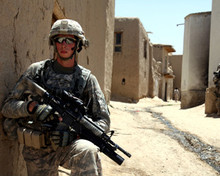
The archive is a six-year record of military action in Afghanistan by coalition forces, spanning December 2004 to December 2009. It includes previously unreleased information about the killing of civilians by coalition troops, a surge in Taliban attacks, and evidence that Pakistan and Iran may be aiding the country's insurgents.
The Guardian, the New York Times and Germany's Der Spiegel also published the leaked material yesterday in a coordinated move across several jurisdictions designed to reduce the risk of gagging orders being issued.
The three newspapers were provided with access to the archive by WikiLeaks several weeks ago via a secure website.
According to the Guardian report, WikiLeaks editor Julian Assange feared that the significance of the documents might be missed if they were simply "dumped on the web".
"Instead he agreed that a small team of specialist reporters from the Guardian could have access to the logs for a few weeks before WikiLeaks published, to decode them and establish what they revealed about the war," writes Guardian reporter Nick Davies.
Along with WikiLeaks, the newspapers have made raw data from the leak available to download through their websites. Earlier this month, Assange spoke at the Centre for Investigative Journalism summer school and called for news organisations to make more raw materials available online in order to increase transparency throughout journalism.
The Guardian makes clear that no fee was involved in the transfer of information from WikiLeaks to the newspaper, and that Assange had no say over the preparation of the newspaper's reports.
Both the newspaper and WikiLeaks editor claim to have removed material from the archives prior to publishing which may have endangered the lives of troops and identity of sources.
The release of the Afghanistan documents follow another high-profile leak earlier this year by WikiLeaks. In April the site published a video showing two US Air Force Apache helicopter pilots killing two Reuters cameramen and several Iraqi civilians. A 22-year-old intelligence analyst, Bradley Manning, has been arrested in connection with the leak after confessing his actions to computer hacker Adrian Lamo, who later identified Manning as the source to Pentagon officials.
Manning faces a military tribunal and a lengthy prison term if found guilty.
Assange claims members of the Pentagon criminal investigations department have tried to arrange a meeting with him on "neutral territory" to secure his help in stopping the leaks but he has refused.
In the US, the New York Times has focused its coverage on the allegation that Pakistan has been aiding insurgents in Afghanistan, despite receiving funding from and being "an ostensible ally of" the US.
The White House has criticised the publication of the files: "We strongly condemn the disclosure of classified information by individuals and organisations, which puts the lives of the US and partner service members at risk and threatens our national security. WikiLeaks made no effort to contact the US government about these documents, which may contain information that endanger the lives of Americans, our partners, and local populations who co-operate with us."
Image courtesy of the US Army on Flickr
Free daily newsletter
If you like our news and feature articles, you can sign up to receive our free daily (Mon-Fri) email newsletter (mobile friendly).
Related articles
- The impact of the Lockdown Files on journalism, with Cablegate journalist James Ball
- DCMS-backed media literacy programme is supporting vulnerable internet users
- Tip: Lessons from the Guardian's membership model
- How should the media cover COP26 and climate change long-term?
- Decolonising journalism: what does it mean, why does it matter and where do you start?









